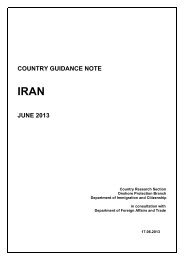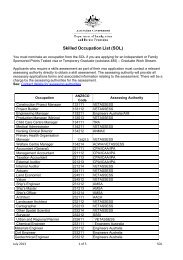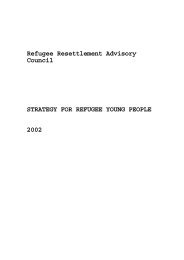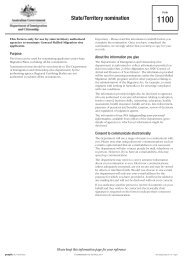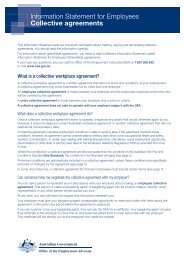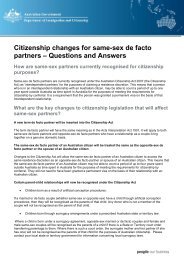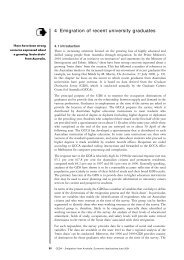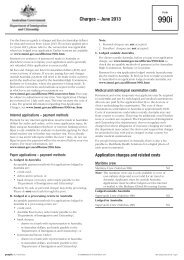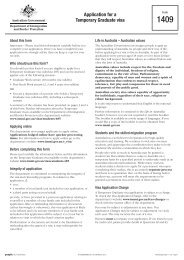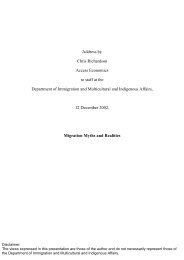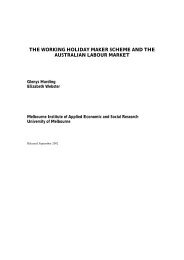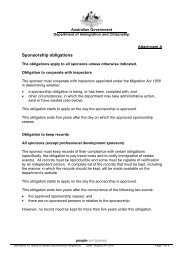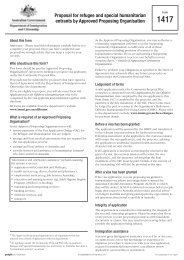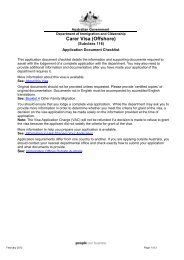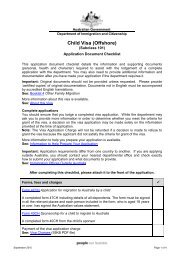Evaluation of the Integrated Humanitarian Settlement Strategy (IHSS)
Evaluation of the Integrated Humanitarian Settlement Strategy (IHSS)
Evaluation of the Integrated Humanitarian Settlement Strategy (IHSS)
You also want an ePaper? Increase the reach of your titles
YUMPU automatically turns print PDFs into web optimized ePapers that Google loves.
and <strong>the</strong> information is expected to be available to Posts and on <strong>the</strong> DIMIA website by mid 2003.<br />
Information will cover general issues as well as State, Territory and regionally specific material. It will<br />
be translated into various languages and distributed via fact sheets as well as on-line.<br />
2.3 Commonwealth funded services for survivors <strong>of</strong> torture and trauma<br />
2.3.1 Historical overview<br />
Commonwealth funded services for survivors <strong>of</strong> torture and trauma include both EHAI under <strong>the</strong> <strong>IHSS</strong><br />
(funded by DIMIA) and PASTT (funded by DHA). Both are currently delivered by <strong>the</strong> FASSTT<br />
(formerly <strong>the</strong> National Forum <strong>of</strong> Services for Survivors <strong>of</strong> Torture and Trauma). The Forum is a<br />
network <strong>of</strong> organisations which <strong>of</strong>fers specialist support for people who have come to Australia from<br />
countries where <strong>the</strong>y have experienced torture and o<strong>the</strong>r forms <strong>of</strong> trauma. There is one member <strong>of</strong><br />
<strong>the</strong> Forum in each State and Territory.<br />
Since 1997 DIMIA has contracted <strong>the</strong> Forum to provide specialised torture and trauma support to<br />
newly arrived refugees and o<strong>the</strong>r <strong>Humanitarian</strong> Program entrants.<br />
The history <strong>of</strong> <strong>the</strong> EHAI component <strong>of</strong> <strong>the</strong> <strong>IHSS</strong> was built around pilot services initiated by members<br />
<strong>of</strong> <strong>the</strong> Forum in <strong>the</strong> early to mid nineties. These initiatives were generated principally to meet new<br />
challenges created by <strong>the</strong> closure <strong>of</strong> migrant hostels in Victoria and NSW for <strong>the</strong> reception, care and<br />
initial accommodation <strong>of</strong> newly arrived refugees. They were also a response to <strong>the</strong> need to provide<br />
‘on arrival accommodation’ facilities to Bosnian refugees recently released from concentration camps.<br />
These challenges emerged from a desire to decentralise this component <strong>of</strong> <strong>the</strong> settlement service and<br />
move new arrivals more directly into living in <strong>the</strong> community. However, this goal was seen as being<br />
compromised by several factors including:<br />
<br />
<br />
<br />
<br />
limited expertise and services to meet <strong>the</strong> particular needs <strong>of</strong> newly arrived refugees by<br />
governments, health, community, educational and to a lesser extent settlement service providers<br />
a lack <strong>of</strong> adequate resources to facilitate timely access to general and specialist services<br />
<strong>the</strong> absence <strong>of</strong> a coordinated and systematic model for providing initial settlement services<br />
a marginal role in <strong>the</strong> provision <strong>of</strong> targeted services to this client group by State and Territory<br />
government services.<br />
In October 1997 DIMIA funded a proposal from <strong>the</strong> Forum to establish a National Early Intervention<br />
Service (EIP) for Refugee and <strong>Humanitarian</strong> Program entrants. This funding was in <strong>the</strong> form <strong>of</strong> annual<br />
grants. DIMIA funded members <strong>of</strong> <strong>the</strong> Forum approximately $2.5 million to deliver <strong>the</strong> EIP across<br />
Australia in 1999-2000. The EIP essentially expanded <strong>the</strong> pilot project models developed by <strong>the</strong><br />
Forum agencies.<br />
The EIP was developed in each State and Territory by <strong>the</strong> relevant Forum member to:<br />
collaborate with key health and settlement services to establish systems for <strong>of</strong>fering routine<br />
assessment to <strong>Humanitarian</strong> entrants shortly after <strong>the</strong>ir arrival in Australia<br />
<strong>of</strong>fer assistance to entrants to address physical and psychological health problems which may<br />
become barriers to successful settlement<br />
facilitate entrants’ access to mainstream services and resources required for successful<br />
settlement<br />
10<br />
<strong>Evaluation</strong> <strong>of</strong> <strong>the</strong> <strong>Integrated</strong> <strong>Humanitarian</strong> <strong>Settlement</strong> <strong>Strategy</strong> 27 May 2003



